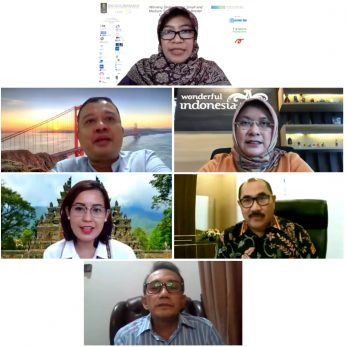GNAM Week Day 3: MM FEB UI Focuses on Tourism and Aviation in the Covid-19 Era
Nino Eka Putra ~ PR of FEB UI
Nisa Adzhani L, Nara Pangestika Vidyani, and Silvia Tri Handayani ~ MM FEB UI students
DEPOK – Wednesday (21/10/2020) The third day of Global Network Week, Global Network for Advanced Management (GNAM) with the theme “Winning Strategies for Small and Medium Size Businesses Amidst the Covid-19 Pandemic” was focused on tourism and aviation.
Session 1: Survival and Planning Recovery for the Most Impacted Industry
This session presented two speakers, Rizki Handayani Mustafa, Deputy of Tourism Products and Organizing Activities of the Tourism and Creative Economy Agency, and Edwin Hidayat Abdullah, Vice President Director of PT Angkasa Pura II, moderated by Dr. Yasmin Nasution.
As the first resource person, Rizki Handayani Mustafa explained that in 2019, the Ministry of Tourism and Creative Economy with the tagline “Wonderful Indonesia,” had prepared a strategy to develop and market tourism products comprehensively, from upstream to downstream. In 2020, all of a sudden, Covid-19 arose, which caused the tourism sector to be affected, which can be seen from a decreasing number of tourists. The supporting aspects of tourism were also badly affected. Thus, the strategy had to be changed.

For this reason, Indonesia is attempting recovery efforts through optimization of social media in the form of webinars, virtual events, and promotions through content creators. The tourism sector and the creative economy must also prepare for the new normal era by means of health protocols, building public trust, increasing tourist demand, and creating tourism attractiveness.
Edwin Hidayat Abdullah, as the second resource person, added that the Covid-19 pandemic caused an unprecedented decline in traffic movements of Angkasa Pura II until Q3-2020. The impact on Indonesia is a sharp decline in foreign tourists, ranked the second most risky country to visit in Asia Pacific, the cancellation of 45,000 tourists’ travel plans, the cancellation of several important events in Jakarta, the closure of 700 hotels across Indonesia, and a sharp decline in domestic routes and the cancellation of international routes. The GDP growth forecast in the worst-case scenario could drop to 0 to -2.5%, and the current account will grow in deficit.

According to Edwin, tourism and aviation industries have a great potential to grow. Yet, several challenges remain. Domestic tourists are predicted to be the main driver for the improvement of post-Covid19 tourism sector in Indonesia. Two important things for our tourism are borderless tourism and community involvement. Tourists also need certainty while traveling to create more experiences and a safe level for traveling.
Session 2: How Indonesia Tourism Industry is Adapting to the New Normal; Bali and Beyond
In session 2, the discussion was led by two speakers, Iswandi Said, President Director of PT. Hotel Indonesia Natour in the first segment, and Ida Ayu Indah Yustikarini, Head of Tourism Marketing Division of the Tourism Office (Bali province) in the second segment, moderated by Hasnul Suhaimi.

Iswandi Said, as a resource person in the first segment, explained that Hotel Indonesia Natour (HIN) is a state-owned company engaged in hotel services which is known commercially as Inna Hotels and Resorts. Just like other companies, HIN faced challenges during the Covid-19 era, with the three biggest challenges namely lower occupancy and productivity, zero customer growth, and maintaining operation amidst the wave of hotel closings. Iswandi continued by saying that, to overcome these challenges, HIN set five priority strategies with the following main points: safety, hospitality and flexibility, sustainability, creativity, and synergy.
Ida Ayu Indah Yustikarini, as a resource person in the second segment, said that before the pandemic, tourism had contributed around 53% to Bali’s economy. But, following the travel-ban during the pandemic, the number of tourists severely dropped. Bali prepared a strategy for handling Covid-19 which is divided based on the structure of the customary village, district and provincial levels.

“Bali tourism in the new normal era will also focus on four core elements, namely cleanliness, health, safety and the environment, as a response to this pandemic situation for a better future. Currently, Bali is still actively implementing tourism marketing strategies, including through branding (Wonderful Indonesia, Thoughtful Indonesia, Indonesia Care and I do care), and advertising (through social media), as well as selling (soft campaigns through influencers and key opinion leaders),” Ida Ayu concluded her session. (hjtp)
(am)









